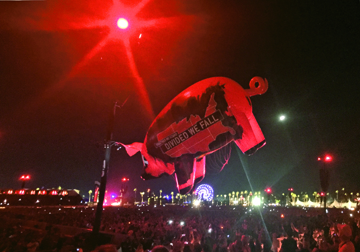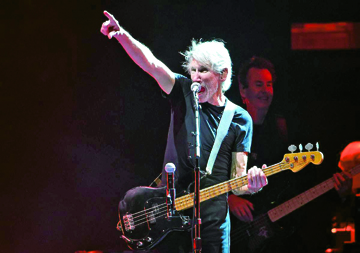by Amy Springer
 Once upon a time, oh who am I kidding, on a beautiful Sunday this October, we were in Indio, California, to attend the Desert Trip festival, or as it is more poignantly known, “Oldchella.”
Once upon a time, oh who am I kidding, on a beautiful Sunday this October, we were in Indio, California, to attend the Desert Trip festival, or as it is more poignantly known, “Oldchella.”
Oldchella is, essentially, a three-day music festival for old people, with performances by the Rolling Stones, Paul McCartney, Bob Dylan, Neil Young, The Who, etc. You get the picture. The performances lasted for hours and by day three, some in our group had had enough. We mustered up a small group for the festival finale, which was to be closed out by Roger Waters, a founder of Pink Floyd.
My family prepared for what we thought would be a pretty garden-variety concert. Our musician son had tickets for the pit, and Mr. Waters had promised a special show that he would play only twice, once that night and the second time a week later during the second weekend of Oldchella. He also promised some sort of “state of the art” sound system and a visual show. Ya, whatever, a concert is a concert, right?
Not so fast. I’ll start with the sound. If you’re old like me, you remember when the original Star Wars was released and a new sound system was debuted. It started in the back of the theater and then reached a deafening crescendo with “The Audience is Listening!” We sure were. Well, Mr Waters’ sound system made that sound like a couple of cans connected by a piece of string. I mean, at times it sounded like an entire fleet of low flying helicopters were landing on your head… in a polo field… with 80,000 plus people in attendance. It consisted of numerous towers of speakers strategically placed throug hout the venue. The effect was as if you had been dropped into Vietnam during an air raid. And that was just the beginning.
hout the venue. The effect was as if you had been dropped into Vietnam during an air raid. And that was just the beginning.
Visually, the show was indescribable. The best I can do is say it felt like a 3D IMAX production, deftly created by Salvadore Dali, with the score being played live by Pink Floyd to perfection. There were lasers, flying pigs, reality bending optical illusions and pointed references that were sometimes ugly, like the images of human trafficking accompanying the song “Money.”
The musicality was such that our musician son opined that Mr. Waters should consider changing the name of the band to something along the lines of “a group of the most well prepared and talented musicians in the world, and oh, also that guy from Pink Floyd.” And it wasn’t like Roger was conceited or suffered from self-aggrandizement. Nope, when it was someone else’s turn, he simply stepped aside. The same can’t be said of the other geezer performers. At one point, he even had a disabled veteran play lead guitar on one of his songs, which brings me to the “comfortably numb” part of this story.
If one thing is abundantly clear, it’s that Mr. Waters is obviously a pacifist and a man of strong moral convictions. His repeated references that he is a voice to all victims rings true. I mean, this man puts his money where his mouth is. He works with disabled veterans and victims of war and crimes. He freely admits his mistakes when he’s wrong, like when he prohibited members of Pink Floyd from using the band name in later years. He is opinionated and speaks his mind. So why, then, did the majority of the crowd empty out of the venue before he played his great hit “Comfortably Numb”?
To understand, you probably have to go back to earlier in the show when he played “Pigs (Three Different Ones),” prominently featuring the word “charade.” During this particular song, the giant screens behind the stage showed various and sundry images of Donald Trump, some with him literally vomiting money, others with his face painted a la Andy Warhol with garish lipstick and eyeliner, images of him as a pig, and culminating in disturbing direct quotes of Trump being flashed across the screen. As recorded, the song itself is nearly 12 minutes long, and the onslaught against Trump in the live performance lasted longer than that. The crowd went wild, especially when a giant pig balloon was unleased with a skull morphing into Trump’s face imposed with the words “Racist Sexist Pig” among others on one side, and “together we stand divided we fall” on the other.
The excited reaction of the crowd was understandable not just because of Trump’s recently-surfaced embarrassing Access Hollywood audio/videotape, because that the show was in deep-blue California, but also because the show was on the night of the second presidential debate. The debate where Trump gleefully promised that one of his first acts as President would be to en-sure Hillary Clinton was incarcerated. No due process, no deference to the numerous Republican-controlled investigations into her alleged wrongdoings which led the FBI Director (also a Republican) to publicly acknowledge that no reasonable prosecutor would prosecute the case against her. Trump’s attitude — “to the guillotine,” to the cheers of his supporters in attendance at the debate, was pretty scary stuff and the Oldchella crowd was anxious to vociferously express its displeasure.
But then, shortly thereafter, Roger Waters blasted Israel and the reaction wasn’t quite so, shall we say, positive. Waters has a bit of a history in this regard, and to most, it isn’t pretty. He’s an avid supporter of the BDS movement (Boycott, Divest and Sanctions), a pro-Palestinean anti-Israel hate group that urges artists and business people to cease doing business with Israel. He refers to Israel as “occupying” the West Bank, and has tried to personally shame performers into participating in his cultural boycott of the nation. Ironically, The Jerusalem Post recently noted that many of the Oldchella performers, including The Rolling Stones, Bob Dylan, Paul McCartney and Neil Young “have all been victimized by and explicitly rejected BDS pressure, including personal appeals from Waters himself.” Some bands claim they even received death threats after refusing to bow to the BDS’ demands. I’m sure it made for some interesting moments backstage at the festival.
In the same October 19 article, The Jerusalem Post described BDS like this: “Though it often presents itself as a movement working to achieve Palestinian rights, to the founders and leaders of the BDS movement it is merely a tool to end the existence of the State of Israel. This violent aim is sometimes reflected in the tactics of boycott supporters.” It’s pretty safe to say that this narrative is likely shared by most, if not all, western nations.
But to simply shun Waters and leave his show in exodus for expressing these unpal-atable views misses the point. Waters is, in my opinion, woefully ignorant when it comes to the Israeli/Palestinian conflict. While it may be tempting to characterize it as a classic case of David vs. Goliath, the analogy does not work unless you are prepared to accept Goliath as the huge, friendly neighbor who just wants to get along and David, despite his miniscule size, is rather intent on ensuring Goliath suffers a painful and untimely death. Waters’ speech was offensive to the point where many in the crowd simply could not stand by and take it anymore. When he was finished, I turned to my husband and said “I wish he hadn’t said that.” But we didn’t leave.
We didn’t leave because we understood from the show that Waters is not just a pacifist, he is also an activist. He does fantastic work with wounded veterans, including American veterans. His father was a soldier killed in World War II, and he performs benefit concerts to raise money for veterans’ causes. In 2012, he reported to the Boston Herald that he shares “enormous empathy with the men [veterans]” and added, “I’ve been around the sense of loss and what loss from war can do to people.” It must make sense to him that the loss and suffering of the Palestinian people equates to the loss from war, all wars.
Had we walked out after Waters’ BDS proclamation, after recognizing his courage in relentlessly calling out Donald Trump or being a “charade” and a “pig,” our hypocrisy would have been on full display. Just because one is a fan of his music doesn’t mean that we care what Waters thinks about anything. Nonetheless, it’s difficult not to admire the fearlessness he displays when expressing his own opinions and his charitable tendency to put his money where his mouth is. Mark Zuckerberg recently faced a similar quandary when questions arose regarding Facebook board member Peter Thiel’s support of Donald Trump. In an internal memo, Zuckerberg pointed out that while he/the company “care[s] deeply about diversity” … “[t]hat’s easy to say when it means standing up for ideas you agree with. It’s a lot harder when it means standing up for the rights of people with different viewpoints to say what they care about. That’s even more important.”
Although I have been on this planet for many years, an important lesson reemerged that October night, one that Mark Zuckerberg knows and I thought I knew, but I guess I really didn’t appreciate. If you admire someone’s talent and views when they agree with you, you really can’t ostracize or hate them when they don’t. Each view is potentially worthy of merit and consideration, no matter how unpalatable it is.
Amy Springer is a senior litigator with Springer and Steinberg, P.C. specializing in complex divorce litigation.

